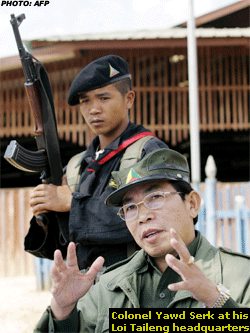On Patrol with the Shan State Army
(Page 2 of 3)
SSA-S soldiers sign on for five years, but two thirds of them are said to remain in the army when their enlistment expires. The overall strength of the army was reinforced in May 2005 by the addition of 1,000-2,000 former soldiers of the Shan State National Army, who joined ranks with the SSA-S under the leadership of Jai Yi, the present SSA-S second-in-command. “We are the strongest opposition force to the regime, the SPDC’s fiercest opponents,” says Yawd Serk.
He is particularly proud of the SSA-S training program, which he says concentrates on all-round instruction, including intellectual studies and ethics. The importance of unity and camaraderie is stressed.
A reporter on patrol with these SSA-S soldiers gets a rare insight into how this training converts into battleground experience. With United Wa State Army positions clearly visible only a couple of hundred meters away in the valley below, SSA-S soldiers brandishing AK 47s and RPG launchers were reconnoitering enemy positions under a dark sky.
At an SSA-S forward position battered by the UWSA and Burma Army in a fierce battle in April 2005, the ground was still littered with exploded mortar shells. A commanding officer who led the SSA-S defense of the outpost recalled with undisguised emotion the intensity and brutality of the battle, during which UWSA troops clawed up the steep slopes, engaging SSA-S forces with RPG’s at 10 meters range and AK fire at 5 meters. “This hill still smells of blood to me,” he said.
 Ultimately, Yawd Serk’s men successfully prevented the UWSA and Burma Army troops from overrunning the Shan position, which could have served as a staging point for further offensives on Loi Taileng. Yawd Serk claims the assault by the UWSA’s 171st division was led by the notorious drug trafficker Wei Hsueh-kang in retaliation for the destruction by SSA-S forces of his drug factories. “I get blamed for drugs because I wage war on those who really are in the business,” he says, insisting that he and his SSA-S have no part in drug production or trafficking.
Ultimately, Yawd Serk’s men successfully prevented the UWSA and Burma Army troops from overrunning the Shan position, which could have served as a staging point for further offensives on Loi Taileng. Yawd Serk claims the assault by the UWSA’s 171st division was led by the notorious drug trafficker Wei Hsueh-kang in retaliation for the destruction by SSA-S forces of his drug factories. “I get blamed for drugs because I wage war on those who really are in the business,” he says, insisting that he and his SSA-S have no part in drug production or trafficking.
On the contrary, Yawd Serk claims to be a force in the war on drugs, which he describes as “a silent killer.” Drugs, he says, “pose as great a threat as the ravages of war to Shan people.” He pleads for a “grassroots solution” to the drug problem. “I want to get rid of drugs but I cannot do it alone. If you really want to eradicate drugs you must come to the Shan people. A grassroots solution is the only way.”
The battle-hardened colonel offered his full co-operation with international organizations in the fight to eliminate drug production and trafficking. “We would like to join the rest of the international community in the eradication of drugs,” he said. “Bring the UN, we have guides, we’ll give you access. Come work with us.
« previous 1 | 2 | 3 next page »
